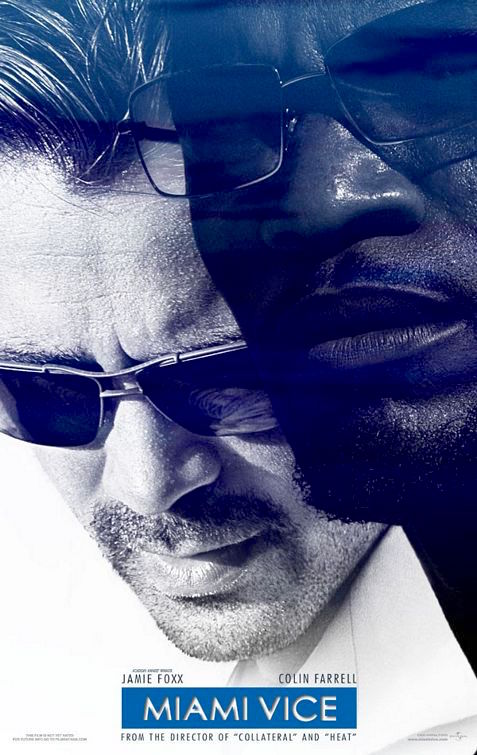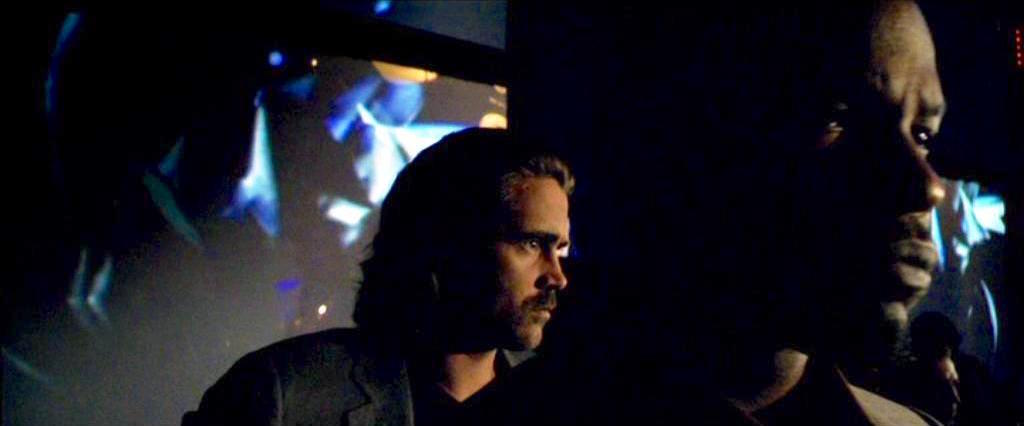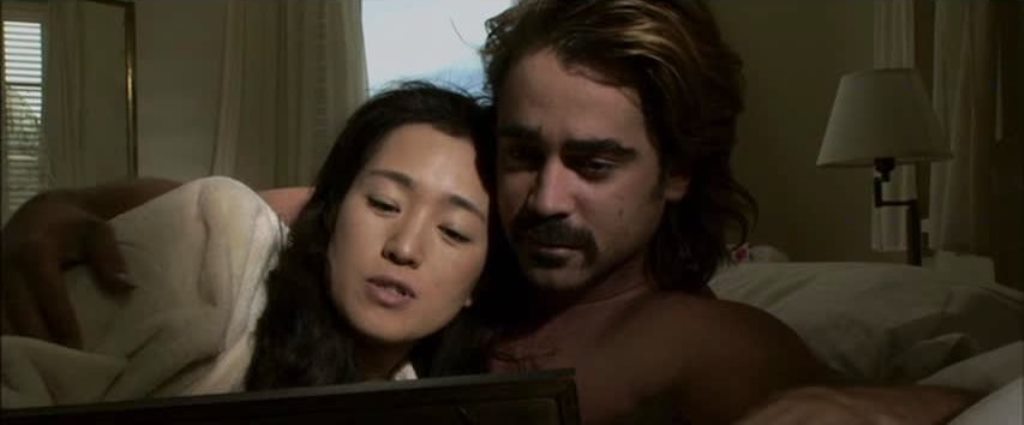Michael Mann's "Miami Vice" 10 Years Later
 Thursday, July 28, 2016 at 2:40PM
Thursday, July 28, 2016 at 2:40PM Please welcome back new contributor Bill Curran for a 10th anniversary look at Miami Vice
 The major studio head-scratcher of its year, the ultimate distillation of Michael Mann’s brand of clean sheen noir, and the most authentically auteurist film of the aughts, Miami Vice was the movie offspring of a successful and ever-parodied 80s TV series that was nothing like the original. Instead, Mann unleashed a brooding and voluptuously pixilated peacock of a crime thriller upon an unsuspecting public
The major studio head-scratcher of its year, the ultimate distillation of Michael Mann’s brand of clean sheen noir, and the most authentically auteurist film of the aughts, Miami Vice was the movie offspring of a successful and ever-parodied 80s TV series that was nothing like the original. Instead, Mann unleashed a brooding and voluptuously pixilated peacock of a crime thriller upon an unsuspecting public
If only every recent remake had as much reckless spirit as this one did when it opened nationally ten years ago today. Though the film received favorable notices from top print critics, including a rave from A.O. Scott, the majority of reviewers (and almost all audiences) were simply confused...
In hindsight, the perception of Miami Vice as a curious aesthetic experiment with fizzled box office returns had as much to do with Mann’s refusal to invest the movie and its new Crockett and Tubbs (Colin Farrell and Jamie Foxx) with the same pop faux-gravitas employed by TV leads Don Johnson and Philip Michael Thomas, as it did with the director’s daring leap forward into the digital filmmaking vanguard.
For starters, Michael Mann was one of the original series’ creators; he went on to become among the most respected (if notoriously irascible) studio directors with cultural touchstones like The Last of the Mohicans and Heat. Midway through the 00s, Mann was hired to make Miami Vice hot off the Academy Award-approved successes of Ali and Collateral. After a tumultuous production (which included a shooting, a hurricane, and a rumored $50 million overage to the budget), Universal still decided to go full throttle on the project, marketing the movie as, basically, the series writ large: a seriously cool summer action romp with a gaudy synth soundtrack and the same pastel suits we’d grown to love and mock.

Or maybe the suits were just as perplexed as the future critics and moviegoers. Michael Mann brought to the movie Vice a present-tense yet dreamy quality to a deadly serious narc detective plot, buzzing from scene to scene with little interest in easy audience hooks such as a triumphant arc and quip-filled characters. What matters most here is Crockett and Tubbs’ work (that would be the “vice” part), where horrible stuff—neo-Nazi gangs with military weapons, C-4 bombs, highway suicides—plays out over the whole of Magic City. There is no romantic version of Miami or their job. For every image of the rippling, purple night sky or the jewel-like marriage between sea and sky, there is a dusty freighter yard and a dilapidated trailer park, all captured with exacting clarity by Mann and cinematographer Dion Beebe.
Sure, in the wrong hands, digital-based movies can look sloppy, slapdash, with an all-in-so-it's-all-good attitude to coverage: it's easier to shoot so why compose a shot? Celluloid forces choices and great filmmakers, the best, exploit this challenge. But Miami Vice is a near miraculous case for the digital. Mann uses it to give vibrancy and immediacy to every action. Every glance, punch, piece of fabric, sun flare, and cloud is recorded with the weight of the always-right-now; there are no traditional movie lighting schemes, necessitated by the way light is rendered on film, to shape our experience. Film requires this attention to plotting specific aspects of light in any given scene. Digital captures all light. It’s all attention, all the time. Every moment counts.
This inherent component to digital finds its precise complement in the vice unit’s police work. Crockett and Tubbs, the thugs and big-money crooks, all must be ready, alert, alive to the moment. It’s a matter of loyalty, reading people, sealing the deal. It’s also a matter of not dying, or what is summed up with succinct fortune cookie poetry by Gong Li’s beautiful financial adviser to the drug lords:
Leave now. Life is short. Time is luck.
Capturing exact moments in digital here means reveling in something as wonderful as every drop of sea mist hitting two budding lovers’ faces during a spontaneous speedboat jaunt to Cuba, or as lethal as a bullet traveling twenty-seven hundred feet per second. Every scene is constructed around the digital choice, and Miami Vice wouldn’t be a fraction of the movie it became without its pixels. Few, if any, Hollywood directors have dared to exploit the possibilities of the Thompson Viper camera to these meticulous formal means.

So what made and still makes Miami Vice stick out from Mann’s work, despite its obvious ridiculousness, including the tawdry, impossible-to-follow narrative turns and Farrell’s lion’s mane of a hairdo (not to mention too much talk of mojitos)? The cultish devotion of critics at online zines like Reverse Shot and Slant Magazine certainly helped keep the motor humming on this glistening oddball masterpiece, at least in the minds of cinephiles. And Mann has continued the digital aesthetic charge, though with decidedly less verve: operating in some of the same Vice milieu in the uneven if still riveting ‘net hacking thriller Blackhat, and giving the classic John Dillinger story an almost documentary quality to the period gloss of Public Enemies.
Yet Miami Vice, if its nascent legacy bears upholding, shines on as a testament to Mann as a singular and rather fearless moviemaker. When handed his biggest Hollywood toolbox, to the tune of a $100+ million budget, he pushed his style and thematic interests to their limits. In doing so, in forgoing straight-forward cineplex pleasures for something riskier and more personal, it’s as if Mann were sitting beside Farrell and Li at the same desolate beach house at Vice’s end, with a grey cloudy night settling in over Miami and a romance. Farrell’s reverse of Li’s earlier motto speaks volumes for the characters, the film, and Mann:
Luck ran out. This was too good to last.”




Reader Comments (7)
My friends think I am weird because of how much I LOVE this movie. Not in guilty pleasure way, but as in"this movie is a masterpiece". Because it is.
There are a million reasons why I love this, but for now I have to mention how every single of Michael Mann's best movies, and this one in particular, can combine a exquisite stylization with a deeply felt sense of humanity.
In his best movies, what grounds the characters in this humanity and keeps them from becoming cartoons is a sense of romance (!). This movie is about two love stories, and the Farrell-Li one can be compared to any of WKW's movies, specially Chungking Express. I mean it, and I don't say that because of Gong Li, but because the romance is very well rendered in a character-based and stunningly-visual way. You know this is very romantic when a minor character commits suicide in the first scenes when he is told his wife is dead.
You know Last of Mohicans? Public Enemies? Even Blackhat? They were love stories, too, and these romances were essential to keep these movies human. Women are in supporting roles, but they are not plain romantic interest. They are alive, explosive, masters of their own destiny.
Not all his movies depend on that (Heat, The Insider, Collateral), but he has a very good eye to (straight) romantic carnality.
Agreed, cal! Would have loved to expand on how VICE features probably his most successful romance sublet, though it's rivaled by HEAT and most obviously MOHICANS.
Heat is more of a samurai movie. There's this incredible movie I saw only once on tv in a hotel late night called Samurai Rebellion, with Toshiro Mifune and Tatsuya Nakadai (the Japanese Pacino and De Niro) as two friends that become rivals. That movie surely inspired Heat, in which two rivals could have been friends. I cry everytime I see that ending.
I also feel the ridiculousness of Mann's recent films is part of what makes them so valuable and unique in the grand scheme of contemporary film. I enjoy Mann's embracing of generic tropes. I feel like this particular quality is becoming a motif of sorts. I appreciated this comment from Slant Magazine's assessment of Blackhat:
"If Miami Vice rejects the '80s television show's materialism by turning the city into a digital jungle of irreconcilable loss for its characters, Blackhat goes further by relegating its players to the machinations of narrative device, where storytelling, as a viable medium for philosophical or cultural edification, is as dead as “grand narratives”—a concept enunciated by Lyotard in the aforementioned book."
The "characters as slaves to narrative device" thought is an interesting one and really informs my recent screenings of Mann's millennial movies. The dialogue is silly and seemingly self-serious, but it feels like a comment to me rather than a lack of self-awareness. He's demonstrated a propensity for naturalism in the past, but I think for Mann his more recent films aren't meant to be natural. They are exercises in form and aesthetics, and I agree that his use of digital cinematography is actually responsible for a hefty percentage of Miami Vice's success as it is meaningful and thoughtful rather than showy, empty. He's really someone who exists to push the medium. I think I began to look closer following Blackhat, which I immediately realized was misunderstood and underappreciated.
Also, how cool is the idea of love being the only hope for the central characters of both Blackhat and Miami Vice? Embracing that is pretty brave in this Christopher Nolany, hyperealist, sort of dark and cynical blockbuster film moment we've had going on for the last little while. Mann is just cool and exciting if you ask me!
Sorry to blabber, I've just been on this Mann train and rarely see anyone write about him or his recent films on the blogs I read! Thanks for the post.
I took a big group of people to see this because I thought COLLATERAL was basically a masterpiece - Mann's best work, by far - and love the TV show. I was the only one to like it. And you're so right about the digital camera work. Mann and Beebe was a match in heaven.
Cmon...this movie is a piece of garbage. If theres a franchise that deserves a reboot after this piece of shit, is Miami Vice.
Miami Vice- The Movie has stood the test of time for me and I go back periodically to watch it (10 years on).
It has something to it, just like the series did. Bring on the sequel.